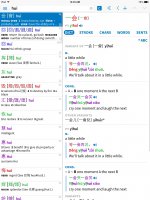JD
状元
When I look at the definition of 一会 in my ABC dictionary, there is a small dot under the "yī", as seen in the attached image. I've seen it in several other places, for example at the bottom of the ABC entry for 会, where the word with the dot should be a link, but does not work.
Is the dot supposed to mean something, or is it a bug?
Is the dot supposed to mean something, or is it a bug?

